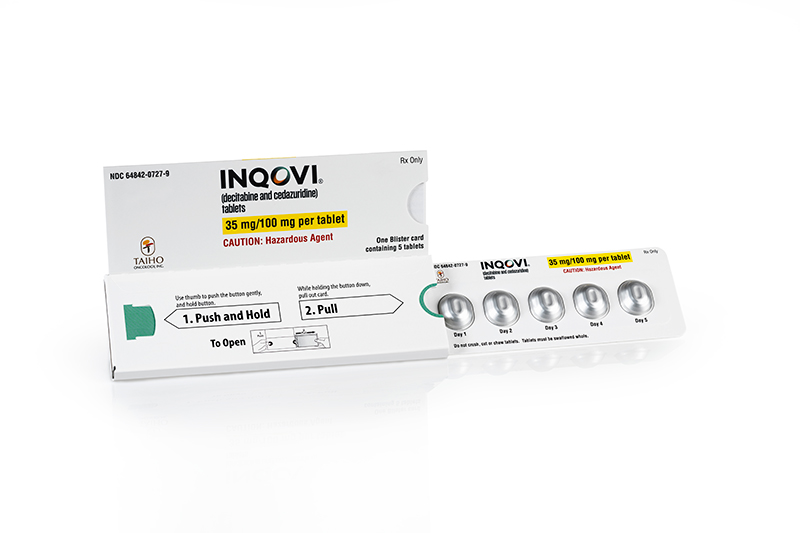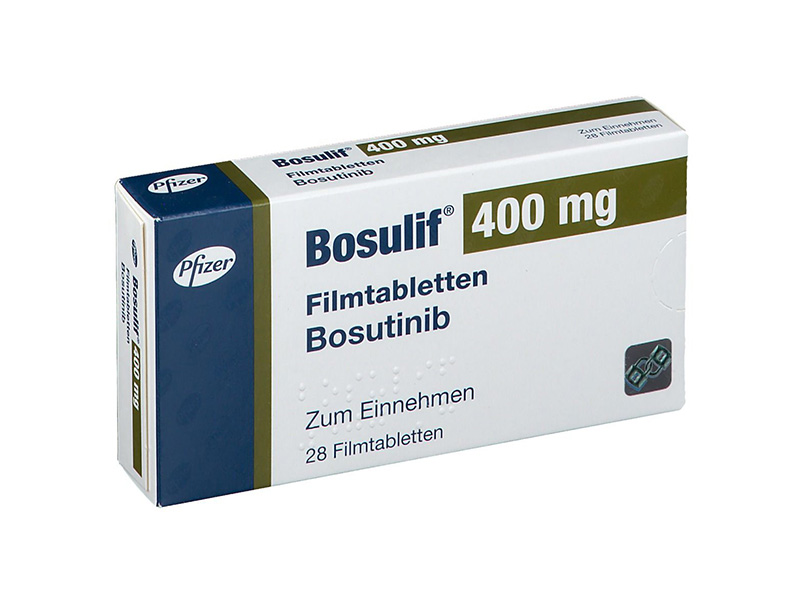Inqovi (decitabine and cedazuridine) vs Bosulif (bosutinib)
Inqovi (decitabine and cedazuridine) vs Bosulif (bosutinib)
Inqovi (decitabine and cedazuridine) is a combination of two drugs used for the treatment of myelodysplastic syndromes (MDS), a group of bone marrow disorders, and chronic myelomonocytic leukemia (CMML), whereas Bosulif (bosutinib) is a tyrosine kinase inhibitor indicated for the treatment of chronic myelogenous leukemia (CML), a different type of blood and bone marrow cancer. Inqovi is administered orally as a tablet, providing a convenient at-home treatment option that was previously available only as an intravenous therapy, while Bosulif is also an oral medication but specifically targets the BCR-ABL tyrosine kinase that is characteristic of CML. The choice between Inqovi and Bosulif would depend on the specific diagnosis and genetic characteristics of the patient's leukemia, as well as other individual health factors, and should be made in consultation with a healthcare provider who specializes in hematologic malignancies.
Difference between Inqovi and Bosulif
| Metric | Inqovi (decitabine and cedazuridine) | Bosulif (bosutinib) |
|---|---|---|
| Generic name | Decitabine and cedazuridine | Bosutinib |
| Indications | Treatment of myelodysplastic syndromes (MDS) including chronic myelomonocytic leukemia (CMML) | Chronic myelogenous leukemia (CML) |
| Mechanism of action | Hypomethylating agent (decitabine) and cytidine deaminase inhibitor (cedazuridine) | Tyrosine kinase inhibitor |
| Brand names | Inqovi | Bosulif |
| Administrative route | Oral | Oral |
| Side effects | Fatigue, constipation, hemorrhage, myalgia, mucositis, arthralgia, nausea, dyspnea, diarrhea, rash, dizziness, febrile neutropenia, edema, headache, cough, decreased appetite, upper respiratory tract infection, pneumonia, and transaminase increased | Diarrhea, nausea, thrombocytopenia, rash, increased alanine aminotransferase, abdominal pain, fever, fatigue, vomiting, cough, and edema |
| Contraindications | Known hypersensitivity to decitabine or cedazuridine | Hypersensitivity to bosutinib or any component of the formulation |
| Drug class | Hypomethylating agent, Cytidine deaminase inhibitor | Tyrosine kinase inhibitor |
| Manufacturer | Astellas Pharma US, Inc. | Pfizer Inc. |
Efficacy
Inqovi (decitabine and cedazuridine) for Leukemia
Inqovi, which combines decitabine and cedazuridine, is a treatment specifically approved for adult patients with myelodysplastic syndromes (MDS), including previously treated and untreated, de novo and secondary MDS with various French-American-British (FAB) classifications, and intermediate-1, intermediate-2, and high-risk International Prognostic Scoring System (IPSS) groups. MDS can be considered a form of cancer that often progresses to acute myeloid leukemia (AML). The efficacy of Inqovi was established based on the results of two open-label, randomized, crossover trials. These trials demonstrated that Inqovi was equivalent to intravenous decitabine in terms of drug exposure and pharmacokinetic parameters, with the added benefit of oral administration.
Patients treated with Inqovi showed hematologic improvement and transfusion independence in clinical trials. The treatment's efficacy is measured by complete remission (CR) rates, duration of CR, and overall survival. In clinical studies, Inqovi has shown to induce CR in a significant proportion of patients with MDS, which is an important factor in improving patient outcomes and potentially delaying the progression to AML.
Bosulif (bosutinib) for Leukemia
Bosulif, also known as bosutinib, is a tyrosine kinase inhibitor approved for the treatment of adult patients with chronic, accelerated, or blast phase Philadelphia chromosome-positive chronic myelogenous leukemia (Ph+ CML) with resistance or intolerance to prior therapy. The efficacy of Bosulif for chronic phase CML was demonstrated in a single-arm trial that enrolled patients with resistance or intolerance to previous treatments. The primary efficacy endpoint was the major cytogenetic response (MCyR) rate at 24 weeks, and Bosulif achieved this endpoint in a significant percentage of patients.
In the accelerated and blast phases of CML, Bosulif's efficacy was evaluated based on hematologic and cytogenetic response rates. The drug has shown to induce hematologic and cytogenetic responses in a subset of patients, which are critical for disease control and progression. The duration of these responses and overall survival are important measures of efficacy in these more advanced stages of CML. Overall, Bosulif has been a valuable addition to the treatment options for patients with Ph+ CML, especially for those who have not responded to or cannot tolerate other therapies.
Regulatory Agency Approvals
Inqovi
-
Food and Drug Administration (FDA), USA

-
Health Canada

Bosulif
-
European Medical Agency (EMA), European Union

-
Food and Drug Administration (FDA), USA

Access Inqovi or Bosulif today
If Inqovi or Bosulif are not approved or available in your country (e.g. due to supply issues), you can access them via Everyone.org.
How it works

Make an enquiry
Choose the medicine you want to buy, answer a couple of questions, and upload your prescription to speed things up. We’ll get back to you within 24 hours.


Make an enquiry
Choose the medicine you want to buy, answer a couple of questions, and upload your prescription to speed things up. We’ll get back to you within 24 hours.


Breeze through the paperwork
We'll guide you through the required documents for importing unapproved medicine, ensuring you have all the necessary information.


Get a personalized quote
We’ll prepare a quote for you, including medicine costs and any shipping, administrative, or import fees that may apply.


Receive your medicine
Accept the quote and we’ll handle the rest - sourcing and safely delivering your medicine.

Some text on this page has been automatically generated. Speak to your physician before you start a new treatment or medication.
Let's talk
If you have any questions, call us or send us a message through WhatsApp or email:
Contact us




